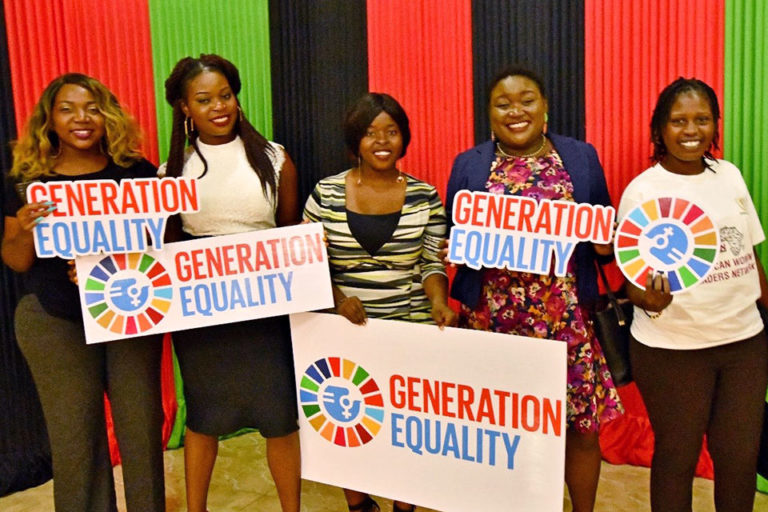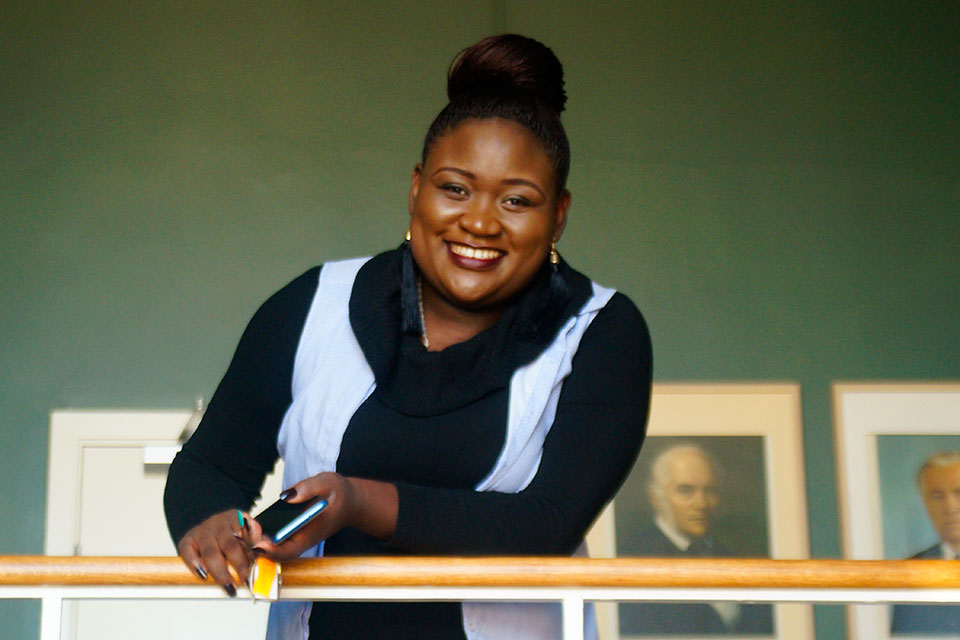Thelma Kaliu is a young feminist and an active member of the Young Feminist Network of Malawi. She is currently the Project Coordinator of the Spotlight Initiative project under Plan International, Malawi. In 2019, before the COVID-19 pandemic, Thelma attended the launch of the Malawi Chapter of the African Women Leaders Network (AWLN) and was excited about the growth of a movement that was enthusiastically embracing young African women.
Supported by the EU-UN Spotlight Initiative, the largest effort to eliminate violence against women and girls worldwide, the AWLN network comprises over 500 African women across generations and sectors.
COVID-19 related movement restrictions and funding reductions have hampered women’s rights organizations at the exact time they are most needed. AWLN and other such organizations act as essential service providers and advocates and must be immediately strengthened to pave the way for a more equal post-COVID future.
What are the most pressing challenges that young women face in your community?
Young women in Malawi face many challenges that arise from the feminization of poverty and gender discrimination in all areas of development. Cultural practices, beliefs, social norms and gender stereotypes trigger gender discrimination and gender-based violence. The lack of women in leadership positions fuels these challenges.
Despite an increasing number of initiatives to support women’s movements, the participation of young women remains limited in these movements and in other areas of development, due to age, location, socioeconomic status, lack of experience and educational background. To a great extent, most women’s movements have only targeted specific classes in urban areas, leaving out rural areas, where the majority of young women live.

What did you learn from the AWLN launch?
The launch of the network gave me high hopes of a new era where young women can fulfil their passion to be great leaders, and play an active role in changing the country, especially as pertains to ending violence against women and girls.
We need to ensure that our generation of young women can meaningfully contribute to policy changes and economic development. The Malawi chapter can help achieve the objectives of AWLN and strengthen more grass-roots networks through the Spotlight Initiative, to reach remote areas of the country.
Related Articles: Invest in Young Women for the Future of Africa’s Public Leadership | Time to Unleash Africa’s Greatest Untapped Power: Women
Why is the Malawi chapter of AWLN relevant to young women today?
Establishing sub-country chapters to advance women’s issues paves the way for more meaningful and inclusive participation for both young men and women. This will boost professional and career development for many in response to Africa’s needs. This is what many young women have longed for.
The chapter also harmonizes women’s movements that have for too long worked in segments. This is an opportunity to interact with women advocates who are dedicating their time to ending violence against women and girls in Malawi. In unity, greater things can be achieved.
How has the pandemic impacted the women’s movement in Malawi, and what can be done to address those impacts?
The pandemic has decelerated the efforts of the women’s movement, but there has also been growing violence against women, and an increase in teenage pregnancies and child marriage. With the drastic increase of gender-based violence, growing poverty is increasing women’s vulnerability and limiting their access to essential services – women’s movements have felt the pressure.
More efforts need to be directed to creating intersectional spaces so as to not leave anyone behind.
On the positive side, solidarity among women’s movements has strengthened. With social and mental pressures increasing, digital spaces have encouraged dialogue, peer support, and discussions on feasible solutions to deal with the crisis. Additionally, we have seen women in Malawi coming together to demand justice for victims of sexual and intimate partner violence, which escalated during the pandemic.
However, this approach has excluded women who don’t have access to digital spaces, and there has been limited access to safe spaces, particularly for women in remote and rural areas. More efforts need to be directed to creating intersectional spaces so as to not leave anyone behind.
What can be done to ensure women’s voices are better heard and their issues are better addressed?
There is a need for inclusiveness. It’s time all stakeholders prioritized our voices. Patriarchal societies and male-dominated systems of government need to look closely at how they can include women in decision-making. We can all help raise women’s voices and advance women’s rights through programmes like the Spotlight Initiative. We request civil society to create pathways of collaboration and capacity-building for young women leaders.
And to my fellow young women, may we never feel too small to meaningfully participate, demand our rights and take the lead in all stages of development, from the grassroots to national level. We all have a voice.
EDITOR’S NOTE: The opinions expressed here by Impakter.com columnists are their own, not those of Impakter.com.— In the Featured Photo: Thelma Kaliu is a member of the Malawi Chapter of the African Women Leaders Network. Featured Photo Credit: UNESCO/Aishwarya Sehgal












